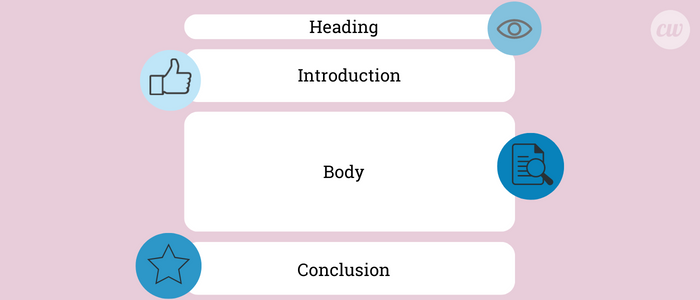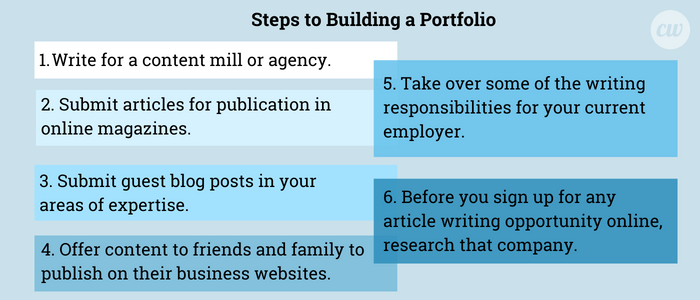What Is Article Writing? Your Guide to Writing Winning Articles
This article has been kindly reproduced from the site: contentwriters.com
An article is a piece of instructive, persuasive, or explanatory content that is typically non-fiction. The demand for article writers is stronger than ever. News and specialty publications need good articles, but so do businesses.
Article writing is increasingly an essential component of the content marketing strategy for small to enterprise-level businesses, therefore, they all need writers.
A quality piece of writing not only gets noticed by search engines but also helps build a relationship with potential customers or keep current customers engaged and informed.
In this article, you will learn the article writing format for a winning article and how you can get paid to write. This blog includes:
- What Is Article Writing and Its Types?
- The Article Writing Format
- How Should an Article Be Written?
- How Can I Start Writing Articles?
- Freelance or Employment?
- Every Industry Needs Article Writers
- Grow Your Article Writing with a Focused Niche
- How Do I Know It’s a Good Niche?
- Where to Find Work as an Article Writer
- Resources for Article Writers
- The Rich World of Article Writing
What Is Article Writing and the Four Types?
An article is an effective format to package and deliver information to a larger audience. Depending on its purpose, an article will most likely fit into one of four types: expository, persuasive, narrative, or descriptive.
The type of article you are writing will also dictate your style and tone. Here is how these four types are commonly seen in business writing.
Expository Writing
Expository writing shares facts and information with the target audience. It includes everything from ‘how to’ articles to research articles published in scientific journals.
Expository articles follow a logical progression and guide the reader to a new understanding. Many of the articles published on the web today are expository because companies are positioning themselves as authorities in their field. They want to demonstrate their knowledge and expertise, offering value to the reader.
Persuasive Writing
Persuasive writing evokes more emotion than expository writing. It is the article writing format for a sales page or anytime you want the reader to feel motivated to take a specific action.
In a persuasive piece of writing, you connect with the reader’s current experience or the problems they are trying to solve. Then, you lead them to understand how they can resolve those problems or benefit by taking your recommended action.
Narrative Writing
Narrative writing is essentially storytelling. It can be a form of persuasive writing, but a good narrative article has a strong introduction followed by rising action, a climax, and a resolution.
The purpose of narrative writing can be to inform, persuade, or connect. You want to take the reader on a journey and lead them to a new understanding through the example of another’s experience.
Narrative writing is a useful way for businesses to engage with customers, share their stories, or build a sense of community.
Descriptive Writing
If you are writing an article that describes a product, its features, and its benefits, you may employ descriptive writing. Descriptive writing sets the scene and delivers concrete, sensory information about a place, thing, or experience.
Descriptive writing is used when you want to set the scene for your reader by giving them all of the sensory information you can. You want to describe the atmosphere, the environment, and what is happening in this piece of writing.
The Article Writing Format
To grab a reader’s attention, articles must be eye-catching. That is why you want to format it correctly with a heading, body, and conclusion.
Your article writing format is the framework you use to present information in an easy-to-consume way. It’s essential to have a clear purpose for each article. You want to build the reader’s expectation with your heading and deliver on that expectation in the body of your article.
Heading
The heading should be a concise and accurate description of what your article will discuss. If you are writing an article for the web, including a keyword in your heading helps search engines understand the content. You also want to format your heading as H1.
Your heading must be eye-catching but also informative. If you grab the reader’s attention with a witty headline that has little to do with your content, you will lose their attention. Search engines clock how long someone looks at your article, so that kind of bait-and-switch works against you.
Your heading will be in title case. It is important to know what to capitalize in a title.
For many articles, you will add a byline with your name under the heading. This depends on if you are writing for a publication that will credit you as the author or if you are ghostwriting.
Introduction
The introduction is an essential element of a good article. Your introduction needs to both draw a reader in and also confirm they are in the right place and will find the information they expect in your article.
Body
Once you’ve introduced your topic, you can dive into the meat of the content in the body of your article. You can determine the length of your article as you are writing it, or you may be given a target word count by your employer.
For the web, you want to divide your content into clear sections with H2 or H3 headings that identify the content that follows. Keep your paragraphs short and make your article body easy to scan. This will help readers get the information they want and stay engaged with your article for as long as possible.
Conclusion
Your conclusion can have a descriptive heading or be called, ‘conclusion”. It is a final paragraph or two that leaves the reader with an appeal, recommended action, opinion, or closing thought.

How Should an Article Be Written?
Now that you know the types and format of an article, you may want to understand the process of how to write one. Here are the steps to follow when writing an article.
- Choose your topic. An ideal topic is focused enough to address in a single article.
- Think about your target audience. What questions are they asking about this topic? What are the most important answers you can deliver to them? You want to speak directly to your reader, so having your target audience clearly in mind is a critical step.
- Gather your facts and data. Do they support the points you plan to include in the article?
- Write an outline, including the headers. Does it flow? Can you cover this topic adequately in the space of an article?
- Write your rough draft.
- Edit. Some writers read their drafts aloud to check for flow and avoid common grammar mistakes. You can use tools like the Hemmingway app or Grammarly to help with this step.
How Can I Start Writing Articles?
To apply for jobs and freelance projects requires work samples. You need to understand web formatting and at least the basics of SEO.
However, if you have no work samples ready, there are several ways to develop a portfolio. The pay for these first steps is little to nothing… but you’ll gain experience and take the first important steps to become an article writer.
To develop a portfolio, you can:
- Write for a content mill or agency that accepts beginners.
- Write and submit articles for publication in online magazines.
- Submit guest blog posts in your areas of expertise.
- Offer content to friends and family to publish on their business websites.
- Take over some of the writing responsibilities for your current employer.
- Before you sign up for any article writing opportunity online, research that company. There are many legitimate opportunities for every skill and experience level, but there are also scams.
Two important things as you get started:
- Do not pay to get work! Legitimate work opportunities don’t charge membership fees.
- In article writing, as in life, if it seems too good to be true, it probably isn’t.
If you’re new to writing, developing your portfolio is a chance to get familiar with different industries, subjects, and formats. Some will be more natural and enjoyable for you. If you don’t like the first thing you try, keep going. There are many more opportunities out there.

Freelance or Employment?
The choice between freelance and employment can be “a little of both.” You don’t have to make a hard and fast choice – take opportunities as they come!
Both working freelance and finding a job require prospecting for work. Success in prospecting requires focused effort. Read on to learn how to begin with an advantage and then pick the one that fits you best and go for it.
Advantages of Freelance
- You can begin before you quit your current job
- You’re building your own service business
- Variety of work
- Over time, your rates can grow to be substantial
- In some cases, you have more control over format, content, and tone
- You choose your specialties and industries
- You can work from home or anywhere
- You can choose your hours
Disadvantages of Freelance
- It takes months or years to build
- Inconsistent income
- Constant prospecting and networking for new projects
- You may work for very low rates for a while
- Freelance websites have fierce competition
- You have to motivate yourself each day
Advantages of Employment
- Steady paycheck
- Benefits
- External accountability
- Consistent work
- Become an expert in that business
Disadvantages of Employment
- Unless employed by an agency with multiple clients, limited content variety
- You may have less choice concerning format, content, and voice
- You work on their schedule
A freelance business is a small business. Freedom comes with responsibility. For some, it’s more than worth it. Others prefer the structure and support of steady employment.
If you’re ready to join the gig economy, give yourself the financial breathing room to ramp up slowly. Start something on the side and build from there.
Every Industry Needs Article Writers
What interests you? What experience do you have? What would you like to learn?
From video games to healthcare to finance… every industry needs article writers. As the web grows, so does the importance of consistent, original, quality content. Primarily because it works! Content marketing generates about three times as many leads as traditional marketing.
The demand for skilled content writers keeps growing. No matter what interests you, someone needs your expertise.
Grow Your Article Writing with a Focused Niche
As you add to your portfolio of work, you can prospect for new jobs and clients. Here’s where the advantages of a niche come into focus.
It’s easier to win a job when you’ve got relevant samples to show them. Writing new samples for every application or bid gets old… fast! On some of the popular freelance websites like Upwork or Guru, employers can get dozens of bids in minutes on their article writing projects. As a freelancer, the better you match an employer’s target criteria, the easier you stand out from the crowd.
You may be skilled enough to research and write on any subject. However, the less you know about a topic, the longer it takes to complete a project. As you develop expertise in a niche, you cut down your writing time and deliver equal or better quality work. When you freelance for a living, less time per project means more money per hour.
Of course, you can have multiple niches! You don’t have to limit yourself to just one and can add more later.
How Do I Know It’s a Good Niche?
If you enjoy the topic, your writing will flow better and feel less like work. You’ll also be more apt to insights that engage and hook your audience. It’s a good niche if you enjoy the subject.
One exception to the follow your heart rule here… if you love fashion but are colorblind, perhaps pick another interest for your first focus. If you think you want to write tech articles but your natural voice is flowery and romantic, you’ll struggle to fit into tech but shine in marketing. It’s better to play to your natural strengths.
The best niche is an in-demand topic you enjoy that aligns with your natural strengths.
Where to Find Work as an Article Writer
Once again, your path towards paid article writing presents options. Which is the best fit for you?
You can apply your skills as an article writer in any of your favorite industries. Avenues to find work in your areas of interest include:
- Job listings for content writers
- Sites where freelancers bid on projects like Freelancer
- Work through web builders, digital marketing companies, or content providers
- Find sites you want to write for and pitch to the owners
- Join a startup company in your area of interest
- Advertise your services locally or online
- Network with your Chamber of Commerce or other business networking groups
- Network through Facebook and LinkedIn
Start with one or two methods of prospecting for work. With steady effort, you’ll find the routes that work for you.
The more people who know your services are available, the better. The bottom line to steady work is to get in front of as many potential employers as possible!
Resources for Article Writers
Improve and refine your blog writing with free online tools. Many grammar checkers offer a free version of their editor. They catch tone and agreement issues missed by Word.
The Hemingway Editor aids with readability by identifying complex and hard-to-read sentences. It tells you the grade level of your writing, highlights passive voice, and offers simpler word alternatives.
To increase the appeal of your headlines, the Advanced Marketing Institute created a free headline analyzer.
If you find yourself repeating words, WordHippo is an online thesaurus that helps keep the word variety interesting.
The Rich World of Article Writing
Whether your dream is to work as an article writer for your current employer or to build your name in the journalism world, there is a demand for your voice and skill. What’s important is to keep writing and continue learning.
In the beginning, the road may be bumpy. Even if you have an idea of who you are as a writer and a clear picture of where you best fit, there will be challenges. It happens to all writers at first.
Or, you may have no idea what interests you or what format works with your natural strengths as a writer. Stay calm! You will continue to learn as you go. The road will become smoother once your work is published and assignments start to fill your email.
When writing is done well, it is a seamless part of the audience’s experience. Article writers shape how content is presented and can influence how people think. Even when writing someone else’s vision, your skill makes it worth reading.
The web is full of people sharing their online success stories. Hopefully, reading this is one small step in your writing journey to success.
This article was written by: Content Writers
